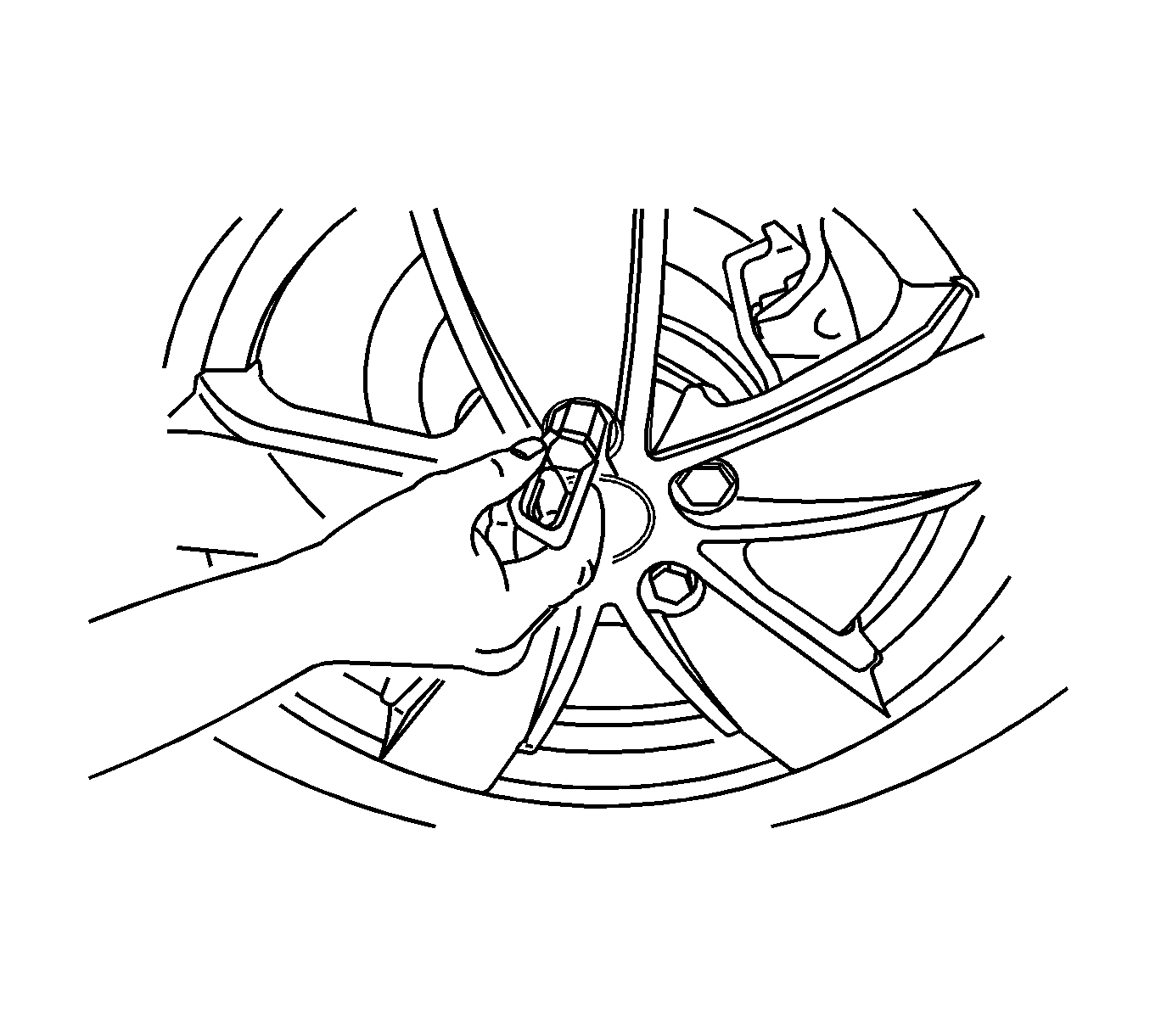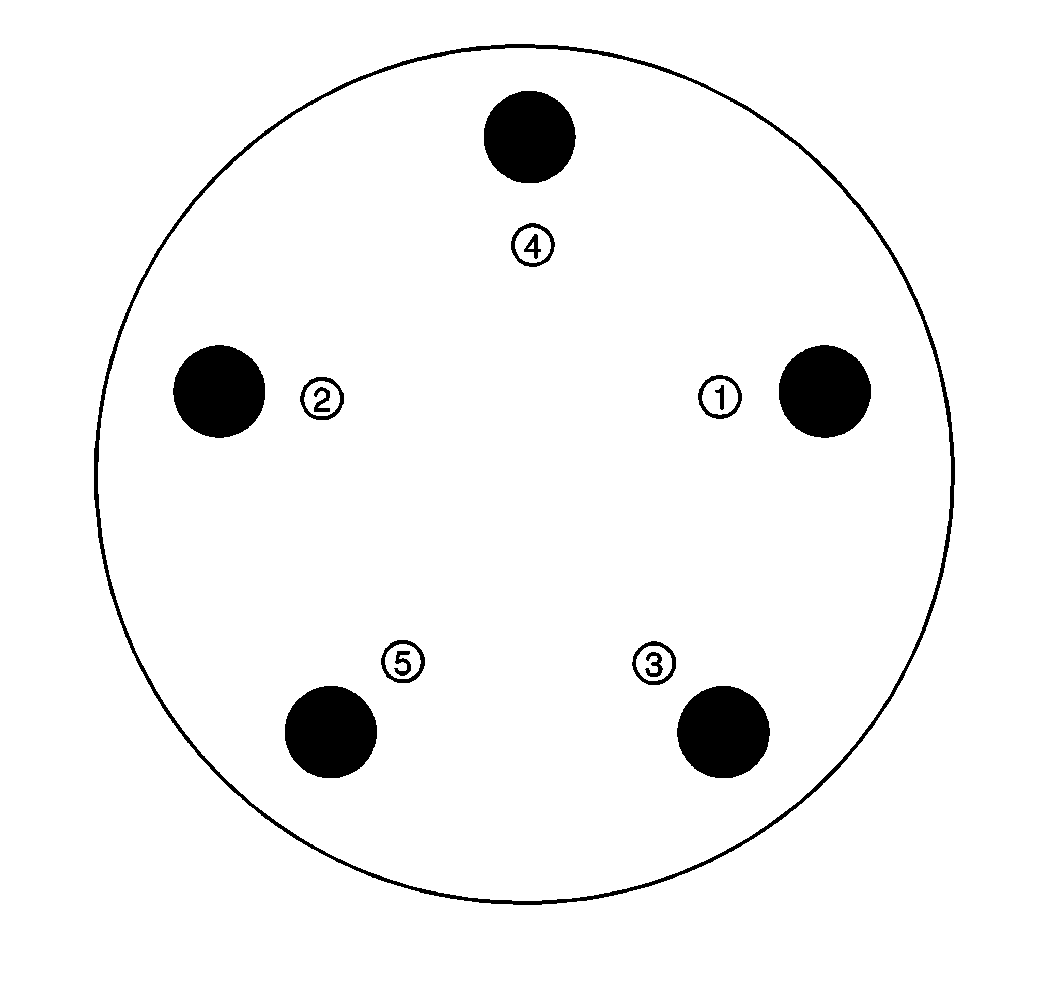Removal Procedure
Tools Required
- Raise and support the vehicle. Refer to
Lifting and Jacking the Vehicle
.
- Use paint or a felt tipped pen in order to mark the relationship of the wheel to the hub.

Important: The wheel nut cap removal tool stores with the spare tire service equipment in the rear compartment.
- Use the wheel nut cap removal tool in order to pull the wheel nut caps off of the wheel nuts.
- Remove the wheel nuts.
Caution: If penetrating oil gets on the vertical surfaces between the wheel and
the rotor or drum it could cause the wheel to work loose as the vehicle is
driven, resulting in loss of control and an injury accident.
Notice: Removing the wheel may be difficult because of foreign materials or
a tight fit between the wheel and the hub/rotor. Slightly tap the tire side
wall with a rubber mallet in order to remove the wheel. Failure to follow
these instructions may result in damage to the wheel.
- If the tire and wheel assembly is difficult to remove, perform the following steps:
| 5.1. | Install the wheel nuts. |
| 5.2. | Loosen each wheel nut 2 revolutions. |
| 5.3. | Remove the safety stands and lower the vehicle. |
| 5.4. | Rock the vehicle from side to side. |
| 5.6. | Drive the vehicle forward slightly. |
| 5.7. | Apply the brakes quickly and firmly. |
| 5.8. | Drive the vehicle backward slightly. |
| 5.9. | Apply the brakes quickly and firmly. |
| 5.10. | Remove the wheel nuts. |
| 5.11. | Repeat this procedure if necessary. |
- Remove the tire and wheel assembly.
Installation Procedure
Caution: Before installing the wheels, remove any buildup of corrosion on the
wheel mounting surface and brake drum or disc mounting surface by scraping
and wire brushing. Installing wheels with poor metal-to-metal contact at the
mounting surfaces can cause wheel nuts to loosen. This can cause a wheel to
come off when the vehicle is moving, causing loss of control and possibly
personal injury.
- Remove any corrosion or foreign material from the wheel and the hub. Use the
J 41013
, or equivalent, in order to clean the following flat surfaces:
| • | The hub mounting surface |
| • | The brake rotor mounting surface |
| • | The wheel mounting surface |
- Use the
J 42450-A
, or equivalent, in order to clean around the base of the studs and the hub.
- Clean the threads on the studs and the wheel nuts.
- Verify the nuts turn freely on the stud.
- Replace any nut that does not turn freely on the stud.
- If a NEW nut does not turn freely on the stud, replace the 5 studs on the hub. Refer to
Wheel Stud Replacement
in Front Suspension or to
Wheel Stud Replacement
in
Rear Suspension.
Important: If the vehicle has directional tread tires, verify the directional arrow on the outboard side of the tire is pointing in the direction of forward rotation.
- Align the match marks and install the tire and wheel assembly to the hub.
Notice: Refer to Fastener Notice in the Preface section.

Caution: Never use oil or grease on studs or nuts. Tighten the wheel nuts with
your fingers until they are snug. Then, tighten the nuts (in the sequence
shown) to the fastener tightening specification shown in Specifications in
this Section. Improperly tightened wheel nuts could eventually allow the wheel
to come off while the vehicle is moving, possibly causing loss of control,
personal injury, and property damage.
Notice: Improperly tightened wheel bolts or nuts can lead to brake pulsation and rotor damage. In order to
avoid expensive brake repairs, evenly tighten the wheel bolts or nuts to the proper torque specification.
- Install the wheel nuts in the sequence shown (1-5).
Tighten
- Tighten the wheel nuts to 70 N·m (50 lb ft).
- Tighten the wheel nuts to 140 N·m (100 lb ft).
- Push the wheel nut caps onto the wheel nuts.
- Remove the safety stands and lower the vehicle.


